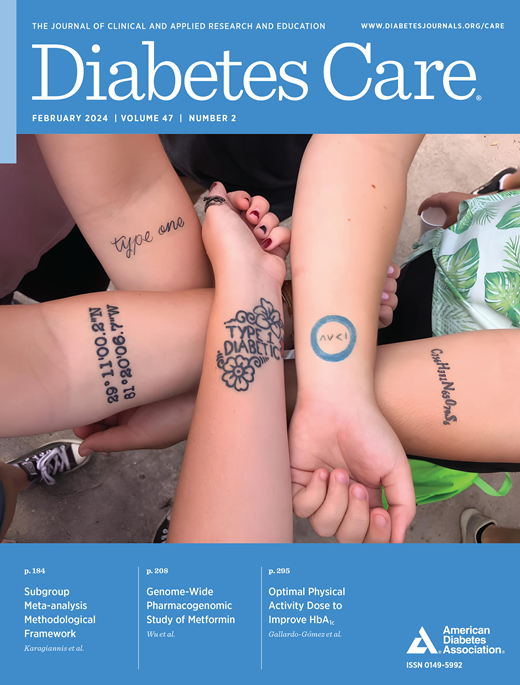Trends in Incidence of Hospitalization for Hypoglycemia and Diabetic Ketoacidosis in Individuals With Type 1 or Type 2 Diabetes With and Without Severe Mental Illness in Denmark From 1996 to 2020: A Nationwide Study
IF 14.8
1区 医学
Q1 ENDOCRINOLOGY & METABOLISM
引用次数: 0
Abstract
OBJECTIVE To examine trends in incidence of acute diabetes complications in individuals with type 1 or type 2 diabetes with and without severe mental illness (SMI) in Denmark by age and calendar year. RESEARCH DESIGN AND METHODS We conducted a cohort study using nationwide registers from 1996 to 2020 to identify individuals with diabetes, ascertain SMI status (namely, schizophrenia, bipolar disorder, or major depression) and identify the outcomes: hospitalization for hypoglycemia and diabetic ketoacidosis (DKA). We used Poisson regression to estimate incidence rates (IRs) and incidence rate ratios (IRRs) of recurrent hypoglycemia and DKA events by SMI, age, and calendar year, accounting for sex, diabetes duration, education, and country of origin. RESULTS Among 433,609 individuals with diabetes, 8% had SMI. Risk of (first and subsequent) hypoglycemia events was higher for individuals with SMI than for those without SMI (for first hypoglycemia event, IRR: type 1 diabetes, 1.77 [95% CI 1.56–2.00]; type 2 diabetes, 1.64 [95% CI 1.55–1.74]). Individuals with schizophrenia were particularly at risk for recurrent hypoglycemia events. The risk of first DKA event was higher in individuals with SMI (for first DKA event, IRR: type 1 diabetes, 1.78 [95% CI 1.50–2.11]; type 2 diabetes, 1.85 [95% CI 1.64–2.09]). Except for DKA in the type 2 diabetes group, IR differences between individuals with and without SMI were highest in younger individuals (<50 years old) but stable across the calendar year. CONCLUSIONS SMI is an important risk factor for acute diabetes complication and effective prevention is needed in this population, especially among the younger population and those with schizophrenia.1996 年至 2020 年丹麦患有或未患有严重精神疾病的 1 型或 2 型糖尿病患者因低血糖和糖尿病酮症酸中毒住院的发病率趋势:一项全国性研究
目的 研究丹麦患有或未患有严重精神疾病(SMI)的 1 型或 2 型糖尿病患者的急性糖尿病并发症发病率在不同年龄和日历年的变化趋势。研究设计与方法 我们利用 1996 年至 2020 年的全国性登记资料开展了一项队列研究,以确定糖尿病患者的身份、SMI 状态(即精神分裂症、双相情感障碍或重度抑郁症),并确定结果:因低血糖和糖尿病酮症酸中毒 (DKA) 而住院。我们使用泊松回归法估算了按 SMI、年龄和日历年分列的复发性低血糖和糖尿病酮症酸中毒事件的发病率 (IRs) 和发病率比 (IRRs),并考虑了性别、糖尿病病程、教育程度和原籍国等因素。结果 在 433 609 名糖尿病患者中,8% 患有 SMI。与非 SMI 患者相比,SMI 患者发生(首次和后续)低血糖事件的风险更高(首次低血糖事件,IRR:1 型糖尿病,1.77 [95% CI 1.56-2.00];2 型糖尿病,1.64 [95% CI 1.55-1.74])。精神分裂症患者反复发生低血糖的风险尤其高。精神分裂症患者首次发生低血糖的风险较高(首次发生低血糖的 IRR:1 型糖尿病,1.78 [95% CI 1.50-2.11];2 型糖尿病,1.85 [95% CI 1.64-2.09])。除了 2 型糖尿病组中的 DKA 外,有 SMI 和无 SMI 患者之间的 IR 差异在年轻患者(<50 岁)中最大,但在整个日历年中保持稳定。结论 SMI 是糖尿病急性并发症的一个重要风险因素,需要对这一人群进行有效预防,尤其是在年轻人群和精神分裂症患者中。
本文章由计算机程序翻译,如有差异,请以英文原文为准。
求助全文
约1分钟内获得全文
求助全文
来源期刊

Diabetes Care
医学-内分泌学与代谢
CiteScore
27.80
自引率
4.90%
发文量
449
审稿时长
1 months
期刊介绍:
The journal's overarching mission can be captured by the simple word "Care," reflecting its commitment to enhancing patient well-being. Diabetes Care aims to support better patient care by addressing the comprehensive needs of healthcare professionals dedicated to managing diabetes.
Diabetes Care serves as a valuable resource for healthcare practitioners, aiming to advance knowledge, foster research, and improve diabetes management. The journal publishes original research across various categories, including Clinical Care, Education, Nutrition, Psychosocial Research, Epidemiology, Health Services Research, Emerging Treatments and Technologies, Pathophysiology, Complications, and Cardiovascular and Metabolic Risk. Additionally, Diabetes Care features ADA statements, consensus reports, review articles, letters to the editor, and health/medical news, appealing to a diverse audience of physicians, researchers, psychologists, educators, and other healthcare professionals.
 求助内容:
求助内容: 应助结果提醒方式:
应助结果提醒方式:


